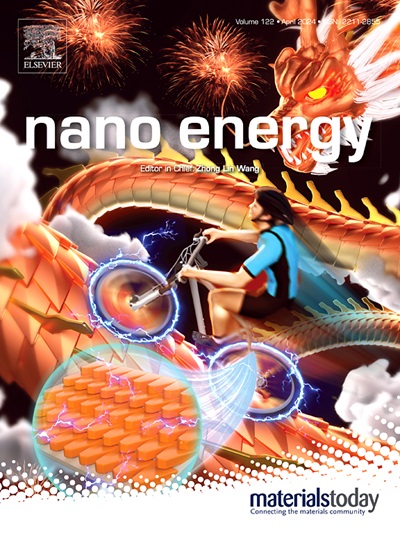Nanogenerator-induced personalized wearable health monitoring electronics: A review
IF 16.8
1区 材料科学
Q1 CHEMISTRY, PHYSICAL
引用次数: 0
Abstract
The fusion of triboelectric nanogenerators and piezoelectric nanogenerators with healthcare biosensors represents a pioneering synergy, propelling wearable technologies into a new era. These nanogenerators have a remarkable ability to harness energy from mechanical movements and seamlessly integrate with biosensors, creating self-powered systems that redefine the landscape of healthcare monitoring. Beyond merely providing power, this integration facilitates continuous, noninvasive monitoring of vital physiological signals such as heart rate and pulse. Nanogenerator-powered biosensors offer a sustainable and environmentally friendly approach by harvesting energy from user movements, blood flow, and heartbeat. This transformative combination not only increases the accessibility and efficiency of wearable health technologies but also paves the way for personalized and comprehensive health monitoring. The potential for a greener and more integrated future in wearable biosensing becomes evident through nanogenerators' environmentally conscious energy-harvesting mechanism. Adding a layer of sophistication, integrating deep learning and machine learning models further propels the capabilities of nanogenerator-powered biosensors. These systems generate intelligent actions in specific situations by using training data and experiences to refine algorithmic models. Thus, the system can formulate appropriate responses and predictions based on acquired knowledge and insights. These insights are invaluable to chronic illnesses such as diabetes or cardiovascular diseases, contributing significantly to the diagnosis and treatment processes.

求助全文
约1分钟内获得全文
求助全文
来源期刊

Nano Energy
CHEMISTRY, PHYSICAL-NANOSCIENCE & NANOTECHNOLOGY
CiteScore
30.30
自引率
7.40%
发文量
1207
审稿时长
23 days
期刊介绍:
Nano Energy is a multidisciplinary, rapid-publication forum of original peer-reviewed contributions on the science and engineering of nanomaterials and nanodevices used in all forms of energy harvesting, conversion, storage, utilization and policy. Through its mixture of articles, reviews, communications, research news, and information on key developments, Nano Energy provides a comprehensive coverage of this exciting and dynamic field which joins nanoscience and nanotechnology with energy science. The journal is relevant to all those who are interested in nanomaterials solutions to the energy problem.
Nano Energy publishes original experimental and theoretical research on all aspects of energy-related research which utilizes nanomaterials and nanotechnology. Manuscripts of four types are considered: review articles which inform readers of the latest research and advances in energy science; rapid communications which feature exciting research breakthroughs in the field; full-length articles which report comprehensive research developments; and news and opinions which comment on topical issues or express views on the developments in related fields.
 求助内容:
求助内容: 应助结果提醒方式:
应助结果提醒方式:


